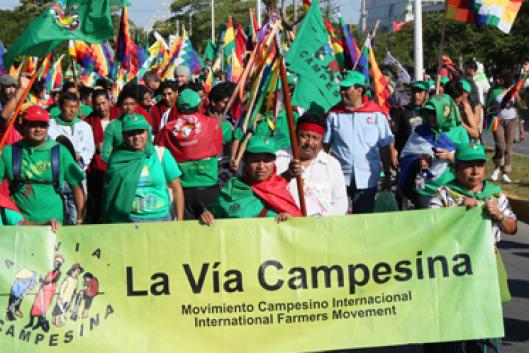Significant advances have been made in recent decades in the struggle for rights at the international level. Numerous countries now recognize a series of economic, social, cultural and environmental rights. Communities and peoples who depend on forests, particularly indigenous peoples, have gained greater recognition of their rights over the territories they have traditionally occupied. In spite of these advances, however, of the very same rights recognized on paper continue to be violated – and increasingly so, as is demonstrated in this issue of the bulletin by articles and testimonies from Nigeria, Sierra Leone, Indonesia and Chile.
What is most striking about these stories of communities seeking to defend their rights is that the companies that are grabbing their lands are considered to have the right to do so – in other words, the governments also view them as rights holders. And in an unequal power game, governments tend to privilege the individual rights of companies and the rights of ‘free’ markets over the collective rights of indigenous communities, peasant farmer communities and others affected by the activities of these companies.
To advance in the struggle for rights, it is undeniably crucial to guarantee and maintain the rights of communities that are increasingly impacted by large-scale corporate projects aimed at appropriating their lands - in fact, nature as a whole (see the January 2014 issue of this bulletin on “Environmental Services”). Moreover, struggles for collective rights, such as that carried on by La Via Campesina for the right to food sovereignty and the rights of peasant farmers, are of enormous importance, precisely because they address collective rather than individual rights – in other words, rights that do not fit into the logic of neoliberalism. Under neoliberal logic, transnationals believe they have the rights – individualized, personified rights – to grab and commodify absolutely everything: the territories of peoples and communities, the water and even the carbon and biodiversity of forests, which are sold to provide big corporations with “the right to pollute and destroy”.
And it is also crucial to recognize that the struggle for rights cannot be separated from the struggle to organize and mobilize with and in communities to defend what is most sacred to them: their territories. These are under greater threat than ever before, in view of the intentions and plans of transnational corporations devoted to the extraction of minerals and oil, the construction of hydroelectric dams, and the expansion of the agroindustry. Therefore, the stories of communities fighting for their territories, usually in isolations, demonstrate the importance of organizing and mobilization, of expanding the potential of alliances between social movements and other sectors of civil society who share a commitment to fighting injustice and promoting social change. And this is not only crucial in order to advance in the struggle for rights, but also to more effectively challenge the unjust and unequal power relations that rule the world and result in a situation where the basic rights of the majority of the people are not fulfilled, while numerous rights are granted to a minority representing the interests of big productive and financial/speculative capital.
